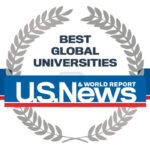Rutgers university ranking us news – Rutgers University Ranking: US News & World Report is a topic that often sparks debate and curiosity among prospective students, academics, and the general public. The prestigious US News & World Report rankings hold significant weight in the academic landscape, influencing perceptions of universities and their standing in the global higher education arena. This article delves into Rutgers University’s performance in these rankings, exploring the methodology behind them, the factors contributing to the university’s position, and the broader impact of rankings on university reputation.
Rutgers University, a public research university with a rich history dating back to 1766, has consistently ranked among the top universities in the nation. Its academic strengths span a wide range of disciplines, including engineering, business, law, and the arts and sciences. Understanding Rutgers University’s ranking in the US News & World Report system provides valuable insights into the university’s overall standing and its strengths in specific areas.
Rutgers University Overview
Rutgers University, New Jersey’s state university, is a renowned institution with a rich history and a strong commitment to academic excellence. Founded in 1766, it is one of the oldest and most prestigious universities in the United States.
History
Rutgers University’s history dates back to 1766 when it was established as Queen’s College in New Brunswick, New Jersey. The college was named after King George III and was initially chartered to educate ministers. Over the years, the institution evolved and expanded, becoming known as Rutgers College in 1825 and Rutgers University in 1924. It has since grown into a comprehensive research university with campuses throughout the state.
Mission and Values
Rutgers University’s mission is to provide a world-class education, conduct groundbreaking research, and engage with the community. The university values academic freedom, intellectual curiosity, diversity, and social responsibility. Rutgers aims to prepare students for success in a globalized world and to contribute to the betterment of society.
Academic Strengths and Notable Programs
Rutgers University is known for its strong academic programs across a wide range of disciplines. Some of its most notable programs include:
- Business: The Rutgers Business School is consistently ranked among the top business schools in the nation. Its programs in finance, marketing, and entrepreneurship are highly regarded.
- Engineering: The School of Engineering at Rutgers is recognized for its innovative research and its strong focus on practical applications. The university offers programs in various engineering disciplines, including biomedical engineering, chemical engineering, and electrical engineering.
- Law: The Rutgers Law School is a leading law school in the United States, known for its rigorous academic program and its strong alumni network.
- Medicine: Rutgers Robert Wood Johnson Medical School is a highly respected medical school that is committed to training the next generation of physicians and researchers.
- Arts and Sciences: The School of Arts and Sciences at Rutgers is home to a wide range of departments, including history, literature, philosophy, and the sciences. It offers a comprehensive liberal arts education that prepares students for a variety of careers.
US News & World Report Ranking Methodology
US News & World Report is one of the most widely recognized and influential university ranking systems in the United States. The organization uses a complex methodology to rank universities based on a variety of factors, aiming to provide a comprehensive assessment of each institution’s academic quality and overall performance.
Key Factors Considered in the Ranking Process
The US News & World Report ranking methodology considers a wide range of factors, grouped into seven categories:
- Academic Reputation: This category accounts for the largest portion of the overall score and reflects the perception of a university’s academic quality among peers, including faculty members at other institutions. It is based on a survey of academic professionals, who rate universities based on their knowledge of the institution’s reputation for academic excellence.
- Undergraduate Teaching: This category evaluates the quality of undergraduate education, including faculty resources, class size, student-faculty ratios, and student engagement in research and other academic activities. Data is collected from the institution’s self-reported information.
- Faculty Resources: This category assesses the quality of faculty members, including their credentials, experience, and research productivity. It takes into account factors like the number of faculty members with doctoral degrees, faculty salaries, and the amount of research funding received.
- Student Selectivity: This category measures the selectivity of a university’s admissions process, reflecting the quality of the applicant pool and the university’s standards for admission. It considers factors like the acceptance rate, the average SAT/ACT scores of admitted students, and the high school GPA of admitted students.
- Financial Resources: This category examines the university’s financial resources, including its endowment, per-student spending, and the percentage of students receiving financial aid. It reflects the university’s ability to provide adequate resources to support its academic programs and student services.
- Alumni Giving: This category measures the level of alumni giving, reflecting the satisfaction and engagement of graduates. It considers the percentage of alumni who donate to the university and the average amount of their donations.
- Graduation and Retention Rates: This category evaluates the university’s success in graduating its students and retaining them from year to year. It considers the six-year graduation rate and the freshman retention rate.
Rutgers University’s US News Ranking Performance
Rutgers University, a prominent public research institution, consistently ranks among the top universities in the United States according to US News & World Report. The university’s performance in national and subject-specific rankings reflects its academic excellence, research impact, and commitment to student success.
Overall National University Ranking, Rutgers university ranking us news
Rutgers University’s overall ranking in the latest US News & World Report national university rankings reflects its position among the top public universities in the nation. The university has consistently ranked within the top 70 national universities, highlighting its strong academic reputation and commitment to providing a high-quality education.
Subject Rankings
Rutgers University excels in several subject rankings, demonstrating its strengths in specific academic areas. The university has earned high rankings in:
- Engineering: Rutgers University’s engineering programs are consistently ranked among the top 100 in the nation, reflecting its strong faculty, research facilities, and industry partnerships.
- Business: The Rutgers Business School is recognized for its high-quality programs, with its MBA program consistently ranking among the top 100 in the nation.
- Law: Rutgers Law School is a highly respected institution, with its programs consistently ranking among the top 100 law schools in the nation.
Ranking Trends
Rutgers University’s US News rankings have generally trended upward in recent years, reflecting the university’s ongoing efforts to enhance its academic programs, research activities, and student support services. The university has consistently improved its rankings in key areas, including undergraduate teaching, research, and faculty resources.
Factors Contributing to Rutgers University’s Ranking
Rutgers University’s high ranking in US News & World Report can be attributed to a combination of factors that reflect its academic excellence, research prowess, and commitment to student success. These factors contribute to its reputation as a leading public research university.
Academic Reputation and Faculty Quality
Rutgers University’s academic reputation is built on a strong foundation of distinguished faculty and rigorous academic programs. The university attracts renowned scholars and researchers who are leaders in their respective fields. The faculty’s commitment to teaching and research is evident in the high quality of instruction and the significant research output produced by the university.
“Rutgers University is known for its strong academic programs and its commitment to research. The faculty is world-class, and the university is a leader in innovation.” – US News & World Report
Research Activities and Funding
Rutgers University is a leading research institution, with a strong emphasis on both basic and applied research. The university’s research activities are supported by substantial funding from government agencies, private foundations, and industry partners. This funding allows Rutgers to conduct cutting-edge research in a wide range of disciplines, contributing to scientific advancements and societal progress.
- Rutgers University is home to several world-renowned research centers, including the Rutgers Cancer Institute of New Jersey, the Waksman Institute of Microbiology, and the Center for Advanced Biotechnology and Medicine.
- The university’s research efforts have led to significant breakthroughs in areas such as medicine, engineering, and environmental science.
- Rutgers University’s research activities attract significant funding from sources such as the National Institutes of Health (NIH) and the National Science Foundation (NSF).
Student Selectivity and Graduation Rates
Rutgers University is highly selective in its admissions process, seeking students who demonstrate academic excellence and a commitment to learning. The university’s rigorous academic standards and challenging curriculum contribute to its high graduation rates, indicating the success of its students in completing their degrees.
- Rutgers University has a competitive acceptance rate, reflecting its commitment to enrolling highly qualified students.
- The university’s strong academic programs and supportive environment contribute to its high graduation rates, demonstrating the success of its students in achieving their educational goals.
- Rutgers University’s focus on student success is evident in its numerous academic support services and resources available to students.
Strengths and Weaknesses of the US News Ranking System
The US News & World Report college rankings have become a widely recognized and influential measure of university quality. While the rankings provide valuable information for prospective students, it’s essential to understand their strengths and limitations to make informed decisions.
Strengths of the US News Ranking System
The US News ranking system has several strengths, including its comprehensiveness and transparency.
- Comprehensive Data Collection: US News collects a wide range of data points to assess universities, including academic reputation, faculty resources, student selectivity, graduation rates, and financial resources. This comprehensive approach allows for a multifaceted evaluation of institutions.
- Transparency in Methodology: US News publishes its ranking methodology, providing clarity on the factors considered and the weight assigned to each factor. This transparency allows users to understand how the rankings are calculated and to evaluate their relevance to their individual needs.
Limitations and Biases of the US News Ranking System
Despite its strengths, the US News ranking system has limitations and biases that can influence the accuracy and fairness of the rankings.
- Overemphasis on Selectivity: The ranking system heavily emphasizes factors related to student selectivity, such as SAT/ACT scores and acceptance rates. This can create a bias towards institutions that admit students with high test scores, potentially overlooking universities that offer strong academic programs but have a less selective admissions process.
- Limited Focus on Student Outcomes: While the ranking system considers factors like graduation rates, it doesn’t fully capture the impact of a university on student outcomes, such as post-graduation employment rates or student satisfaction. This can create a disconnect between the rankings and the actual value a university provides to its students.
- Potential for Manipulation: Universities may engage in practices to improve their rankings, such as increasing spending on research or focusing on attracting high-achieving students. This can lead to an artificial inflation of rankings and may not reflect the true quality of the institution.
Examples of Ranking System Inaccuracies
The US News ranking system may not always accurately reflect the true quality of a university. For example, some institutions with high rankings may have strong academic programs but may lack a diverse student body or offer limited opportunities for student engagement outside the classroom. Conversely, universities with lower rankings may offer excellent value for their students but may not have the resources or reputation to achieve high scores in the US News metrics.
The Impact of Rankings on University Reputation
University rankings, such as those published by U.S. News & World Report, exert a significant influence on the public perception and prestige of higher education institutions. These rankings are widely disseminated and often used as a primary source of information by prospective students, their families, and even potential faculty members.
The Influence of Rankings on Public Perception and Prestige
The prominence of university rankings has led to a situation where institutions are increasingly judged based on their numerical position rather than on a holistic assessment of their academic quality and overall contributions to society. Rankings have become a powerful tool for universities to enhance their public image and attract more applicants. Institutions that consistently rank highly are often perceived as being more prestigious and academically rigorous, which can lead to increased applications, higher acceptance rates, and a greater ability to attract top-tier faculty.
The Impact of Rankings on Student Recruitment and Faculty Hiring
Rankings play a crucial role in shaping the choices of prospective students. Many students and their families rely on rankings to narrow down their college search and make informed decisions. Institutions with high rankings often benefit from increased visibility and a larger pool of applicants, making it easier for them to attract the most qualified students.
Rankings also influence the decisions of faculty members, particularly those seeking positions at prestigious universities. A high ranking can signal a strong research environment, ample resources, and a commitment to academic excellence, making it a desirable destination for ambitious scholars. Universities with a strong track record of ranking highly often have an easier time attracting top talent in their respective fields.
How Universities May Use Rankings Strategically to Enhance Their Reputation
Universities have become increasingly adept at using rankings strategically to enhance their reputation. Some common tactics include:
- Focusing on specific ranking metrics: Universities often prioritize the metrics that are most heavily weighted in the ranking system. For example, they may allocate more resources to research activities, faculty salaries, or student outcomes to improve their scores in these areas.
- Publicly promoting their ranking achievements: Universities often highlight their ranking positions in marketing materials, press releases, and on their websites. This can help to attract attention and reinforce their perceived prestige.
- Participating in ranking-related initiatives: Universities may engage in activities that are designed to improve their ranking performance, such as collaborating with other institutions, developing new programs, or increasing alumni engagement.
Alternative University Ranking Systems
While the US News & World Report rankings are widely recognized, they are not the only measure of a university’s quality. Several other reputable ranking systems provide alternative perspectives on university performance.
These systems often use different methodologies and weightings, resulting in varying rankings for institutions. Understanding the strengths and weaknesses of each system can help students and researchers gain a more comprehensive view of a university’s strengths and weaknesses.
Times Higher Education World University Rankings
The Times Higher Education (THE) World University Rankings is a comprehensive global ranking system that assesses universities across 13 performance indicators grouped into five areas: teaching (30%), research (30%), citations (30%), industry income (2.5%), and international outlook (7.5%).
The THE rankings prioritize research output and international collaboration, reflecting the increasing importance of these factors in the global academic landscape.
- Strengths:
- Comprehensive methodology covering various aspects of university performance.
- Focus on research excellence and international collaboration, reflecting the growing importance of these factors in the global academic landscape.
- Transparent methodology with clear weighting for each indicator.
- Weaknesses:
- Heavy reliance on research metrics may favor research-intensive universities over those with strong teaching and student support.
- May not adequately capture the quality of undergraduate education, which is a key factor for many students.
QS World University Rankings
The QS World University Rankings is another influential global ranking system that uses a methodology focused on six key indicators: academic reputation (40%), employer reputation (10%), faculty/student ratio (20%), citations per faculty (20%), international faculty ratio (5%), and international student ratio (5%).
QS rankings place a strong emphasis on employer reputation and student-to-faculty ratios, reflecting the importance of employability and personalized learning in today’s competitive job market.
- Strengths:
- Strong focus on employer reputation, providing insights into the employability of graduates.
- Consideration of student-to-faculty ratios, highlighting the importance of personalized learning and mentorship.
- Use of a global survey of academics and employers to gather data on university reputation.
- Weaknesses:
- Less emphasis on research output compared to THE rankings.
- Potential for bias in the survey data due to the subjective nature of reputation.
The Importance of Considering Multiple Ranking Systems
Reliance on a single ranking system for university selection can be misleading, as each system has its own methodology, biases, and limitations. It is crucial to consult multiple ranking systems and consider a university’s unique strengths and weaknesses beyond rankings.
Potential Biases and Limitations of Individual Ranking Systems
Each ranking system prioritizes different factors, potentially overlooking important aspects of a university’s quality. Some systems heavily weigh research output, while others emphasize student outcomes or faculty resources. These differences can lead to biases, where certain universities might rank higher based on their strengths in specific areas while neglecting others.
- Focus on Research: Some systems prioritize research output, giving higher rankings to universities with extensive research activity and publications. However, this may not accurately reflect the quality of undergraduate education or student support services.
- Emphasis on Resources: Other systems emphasize factors like faculty resources, student-faculty ratio, and financial resources. While these factors are important, they might not fully capture the quality of teaching or the overall learning experience.
- Limited Data Collection: Some systems rely on limited data, which can lead to incomplete or inaccurate rankings. For instance, rankings based solely on student surveys might not reflect the experiences of all students or account for variations in program quality.
Beyond Rankings: Rutgers University Ranking Us News
While rankings can provide a general overview of a university’s academic standing, they shouldn’t be the sole factor in your decision. Numerous other factors, such as program offerings, campus culture, and financial aid opportunities, should be considered.
A holistic approach to university selection is crucial, taking into account factors that align with your individual needs, interests, and aspirations.
Importance of Visiting a University Campus
Visiting a university campus provides a firsthand experience of the environment, allowing you to immerse yourself in the campus culture and get a feel for the community. It’s an opportunity to interact with current students, faculty, and staff, gaining valuable insights into the academic experience, research opportunities, and extracurricular activities.
Meeting with Faculty and Students
Engaging in conversations with faculty members allows you to explore their research interests, teaching styles, and perspectives on the program. Meeting with current students offers valuable firsthand insights into the academic rigor, workload, and overall student experience.
Personalized Approach to University Selection
University selection is a highly personal decision that should be based on a thorough assessment of your individual needs, goals, and preferences. Consider factors such as program offerings, research opportunities, faculty expertise, campus culture, student support services, and financial aid availability.
For example, if you’re passionate about research, you might prioritize universities with strong research programs and renowned faculty. If you’re seeking a vibrant campus culture, you might consider universities with a strong sense of community and diverse extracurricular activities.
In conclusion, while university rankings provide a useful snapshot of a university’s standing, it’s crucial to remember that they are just one piece of the puzzle. Beyond rankings, prospective students should consider factors such as program offerings, campus culture, financial aid opportunities, and their own individual needs and aspirations. Ultimately, choosing the right university is a personal decision that requires thorough research and a thoughtful evaluation of multiple factors.
Rutgers University has been making strides in its US News rankings, showing a commitment to academic excellence. While focusing on academics, it’s also interesting to see how other universities are performing in their respective fields, like the Arizona University football news , which showcases their athletic prowess. It’s inspiring to see institutions excelling in diverse areas, and Rutgers’ continued rise in the US News rankings is a testament to their dedication to providing a well-rounded education.
Rutgers University consistently ranks highly in US News & World Report, often placing within the top 50 national universities. While Rutgers is known for its strong academic programs, you might also be interested in the the university of texas at austin news to see how another top-ranked university is making headlines. Comparing rankings and news from different universities can provide a broader perspective on higher education trends.






